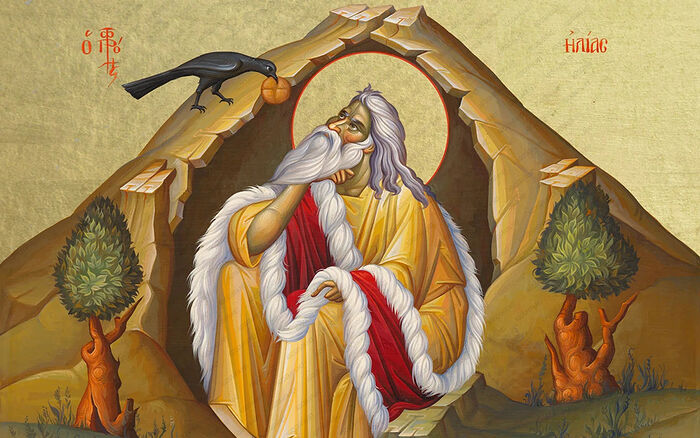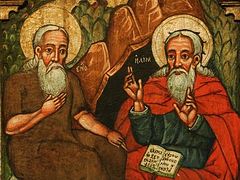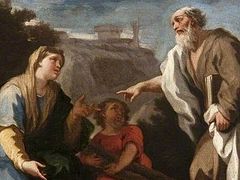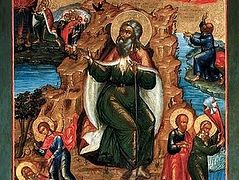Question 51: Doesn’t what Elias said seem bold: There shall not be dew nor rain these years, but according to my word (3 Kg. 17:1)?
It’s audacious to allow yourself such thoughts about spiritual men. Elias was a prophet, the foremost of the prophets, aflame with Divine zeal, and he said this by the action of the Spirit of God. Thus, what he said was fulfilled.
Question 52: How did Elias, being holy and leading a life according to the Law, eat the food brought to him by ravens (3 Kg. 17:6)?
The Lawgiver Himself gave him this food through the ravens. For He Himself commanded him to live by the brook of Cherith, promising to send food by the ravens; and He fulfilled this promise, because the ravens brought him bread in the morning and meat in the evening. And the Lawgiver thereby teaches us that it was only because of the infirmity of the Jews that He decreed such laws. For He Himself sometimes commanded to transgress them. (Thus, Joshua the Prophet, Eleazar the High Priest, and the priests and Levites with him and all the people were commanded to go around Jericho seven times on the Sabbath; so now He commanded the great Elias to receive the food brought him by ravens). And sometimes He didn’t rebuke those who violated such laws. (Thus, Samson was deprived of God’s grace for drunkenness and voluptuousness, but he wasn’t convicted at all for having eaten honey from a honeycomb made by bees in the jaws of a dead lion).
Question 53: Why did God command Elias to go to the foreign widow (3 Kg. 17:9ff.)?
This also shows the reasons for such laws. If God had seen in the Jews a constant mindset and firm faith, then He wouldn’t have commanded them to avoid communicating with foreigners, but, rather, He would have required them to live with them and preach piety to them. This shows the purpose of the Law. For having said: Thy daughter thou shalt not give unto his son, nor his daughter shalt thou take unto thy son (Deut. 7:3), He added: And thou take not of their daughters unto thy sons, that as their daughters go a whoring after their gods, they make not thy sons go a whoring after their gods (Ex. 34:16). The Prophet, who could render them blessings, was not only not forbidden, but was even commanded to go to a foreigner. But I think it was with the intention of showing the Prophet human nature wasting away from famine that the Lord first led him to the brook, and then, having dried it up, to the widow who had nothing but a paucity of food—barely enough for one day. For she said: As the LORD thy God liveth, I have not a cake, but an handful of meal in a barrel, and a little oil in a cruse: and, behold, I am gathering two sticks, that I may go in and dress it for me and my son, that we may eat it, and die (3 Kg. 17:12); that is, I have only the last bit of food, after which I expect to die of starvation. But I’m amazed by the meekness of the woman’s answer: She didn’t resent that in the midst of such misfortunes she was asked for food, but only revealed her extreme poverty. And , although he promised her an inexhaustible source of flour and oil, this great and righteous man nevertheless commanded that she bake and bring bread to him first. And again, the woman didn’t get upset, as one exhausted by her cares and poverty, and widowhood, and the need to feed her children—but hearkening to the promise, she brought him the food. She did it even without knowing the man (because he was a foreigner), without having experienced his prophetic power. I think that she was a prototype of the Church of the Gentiles, because this woman received with faith a man persecuted by the Israelites, as the Church received the Apostles, driven out by the same Israelites.
Question 54: Why did God allow the widow’s son to die (3 Kg. 17:17)?
While eating in abundance, the Prophet forgot about the tribulations of others, so God aroused the cries of the widow against him. And he understood the reason, for he said: O LORD my God, hast Thou also brought evil upon the widow with whom I sojourn, by slaying her son? (3 Kg. 17:20). But the widow’s words are worthy to be marveled at. She says: Art thou come unto me to call my sin to remembrance, and to slay my son? (3 Kg. 17:18), that is, my innermost transgressions are exposed in thy light. Although she was a foreigner, she didn’t say: “You served as a bad omen for me; your coming was the cause of troubles for me.” On the contrary, she attributed what befell her even more to her own sins. How much benefit the prophetic teaching brought her. Therefore, the death of her son happened for her own benefit, so that when she saw the supernaturally accomplished resurrection, she might be established in piety. The Prophet prayed to the Lord for the deceased boy and then, blowing on him three times, brought him back to life. The three times indicates the All-Holy Trinity, and the breathing—the original creation of the soul. However, in breathing, the Prophet created not a new soul, but returned the one that had departed from the body. And the beneficent God Who lovest mankind, seeing mankind dying, seeing that the Prophet doesn’t want to ask for mercy, and pitying the perishing, hurrying to show them mercy, but honoring the Prophet and not deigning to cancel the sentence proclaimed by him without his consent, He Himself comes as an intercessor—the Lord to the slave, the Creator to the dust, and persuades the lips by which the clouds were bound to loose them of their birth pangs. For it says: And it came to pass after many days, that the word of the LORD came to Elias in the third year, saying, Go, shew thyself unto Ahab; and I will send rain upon the earth (3 Kg. 18:1).
Question 55: How ought we to understand what is said: There is no nation or kingdom, whither my lord hath not sent to seek thee (3 Kg. 18:10)?
Because the Prophet said to Ahab: As the LORD God of Israel liveth, before whom I stand, there shall not be dew nor rain these years, but according to my word (3 Kg. 17:1), then Ahab, having tested the truth of these words, of necessity sought the one who closed the clouds with his lips, to do one of two things: either to convince the Prophet to open the clouds, or to kill him if he couldn’t be convinced. Obadiah was very pious. This is seen not only by his words, but also by his deeds. First, seeing the prophets being killed by Jezebel, he not only hid, but also nourished not three, not four, not five, not ten, but a hundred prophets, dividing them into two parts. He wasn’t afraid of the authorities’ cruelty, but preferred piety above all. And then he saw the great Elias, and fell on his face, and said, Art thou that my lord Elias? (3 Kg. 18:7). And what follows also proves the piety of Obadiah. For he says: And it shall come to pass, as soon as I am gone from thee, that the Spirit of the LORD shall carry thee whither I know not (3 Kg. 18:12). This shows in Obadiah a man who contemplates the Divine and understands the power of the Spirit of God.
Question 56: Why, when the Law commanded to serve God in one place, did Elias build an altar on Mt. Carmel (3 Kg. 18:31-32)?
Because the Law is not made for a righteous man, but for the lawless and disobedient, according to the Divine Apostle (1 Tim. 1:9). Because of their carelessness, the Israelites were given a law by God to worship in one place, so that they might not, by receiving permission to worship anywhere, turn to worshiping false gods. The Prophet wanted to show both the impotence of the demons who were seducing the people and the omnipotence of the God of all. It was impossible to lead the Israelites to the Jerusalem Temple because of the division of the Kingdom; therefore he brought them to Mt. Carmel, where he often stayed.
Question 57: How ought we to understand what Elias said to the people: How long halt ye between two opinions? (3 Kg. 18:21)?
The Israelites both worshiped God and served idols, which is why the Prophet added: If the LORD be God, follow Him: but if Baal, then follow him (Ibid.), that is, it’s displeasing to God for false gods to be worshiped, and they are unable to tolerate the worship of the true God. But you do both, preserving good relations with neither.
Question 58: Why did Elias command the priests of Baal to choose a fatted bullock and offer their sacrifice first (3 Kg. 18:25)?
The true God wants for nothing. Therefore, so the ashamed servants of lies might not claim that Baal was upset that he wasn’t the first to be offered a sacrifice, Elias deferred to them. But since with all this they did nothing, for the idols of the nations are silver and gold, the work of men’s hands. They have mouths, but they speak not: eyes have they, but they see not: They have ears, but they hear not (Ps. 113:12-14), then mocking them, the Prophet said: Cry aloud: for he is a god; either he is talking, or he is pursuing, or he is in a journey, or peradventure he sleepeth, and must be awaked (3 Kg. 18:27), that is, peradventure Baal is sleeping, or is busy with some other matter, and therefore he doesn’t hear when they call upon him alone. Therefore, it behooved them to cry out to him together, that a loud cry might drive away his sleep. Carried away by these words, these utterly foolish ones raised a general cry, cutting themselves with knives and lancets until the blood gushed out all over them; because the destroyers of men, being bloodthirsty, delight in human blood, and therefore the priests pleased them with such bloodshed. The author also made this clear, saying they cut themselves after their manner (3 Kg. 18:28).
Having thus revealed their deception both by deferring to them and by giving them nearly the entire day, at the very setting of the sun—the story makes this clear, for it says it was the time of the offering of the evening sacrifice (3 Kg. 18:29), Elias gathered all the people and ordered them to bring stones according to the number of tribes—not ten, but twelve, and rebuilt the altar of the Lord that had been upturned (3 Kg. 18:32). And having laid firewood, he also placed the sacrifice; and having dug a trench about it, he made a reservoir. A Jewish writer called this “faala,”[1] and Josephus calls it a receptacle. To the firewood Elias brings not fire but water, for he also ordered barrels to be brought according to the number of the tribes, and filling them with water, he poured it out on the sacrifice, and not merely once or twice, but thrice, again pointing to the All-Holy Trinity. Finally, having cried out, he implored the God of the fathers to show His superiority, to convert the deceived people, and to accept the burnt offering with God-given fire. And before he could finish his prayer, fire descended and consumed not simply the firewood and sacrifice, but also the dust, the water, and the stones (3 Kg. 18:38), that the Divine altar might not be defiled when the wicked would offer sacrifices to demons upon it. After performing this miracle, Elias ordered these workers of lies to be killed, and then he loosed the clouds from their birth pangs.
Question 59: Why was Elias, having such power, afraid of Jezebel alone (3 Kg. 19:3)?
Because he was not only a prophet, but also a man. On the other hand, his fear was also the work of Divine affection. So that the greatest of miracle-working wouldn’t puff him up, grace allowed nature to give place to fear, and through this for the Prophet to know his own infirmity. This is why the Lord reminded him that 7,000 remained free from wickedness (3 Kg. 19:18). Moreover, He taught him that He recognized it as better to rule mankind with meekness and longsuffering, though it would not be difficult for Him to send thunder and lightning upon the wicked, to shake the earth, to instantly dig a trench for them and to utterly destroy them all with swift winds. For this He said: A great and strong wind rent the mountains, and brake in pieces the rocks before the Lord; but the Lord was not in the wind: and after the wind an earthquake; but the Lord was not in the earthquake: And after the earthquake a fire; but the Lord was not in the fire: and after the fire a still small voice (3 Kg. 19:11-12). He thereby showed that only longsuffering and love of mankind are dear to God, but human malice brings other things upon itself.
Question 60: Why, having received the command to anoint Hazael, Jehu, and Elisha, did Elias anoint only the Prophet (3 Kg. 19:15-16)?
If he anointed the Prophet and transmitted to him spiritual grace, he thereby anointed the others as well, because having received prophetic grace through him, Elisha then transferred the gift to them as well, and gave them the grace of kingship.




